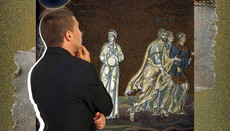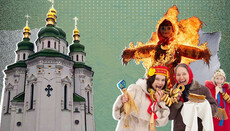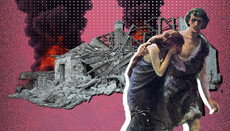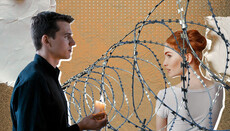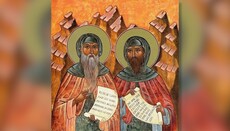What does “coronavirus theology” lead to?
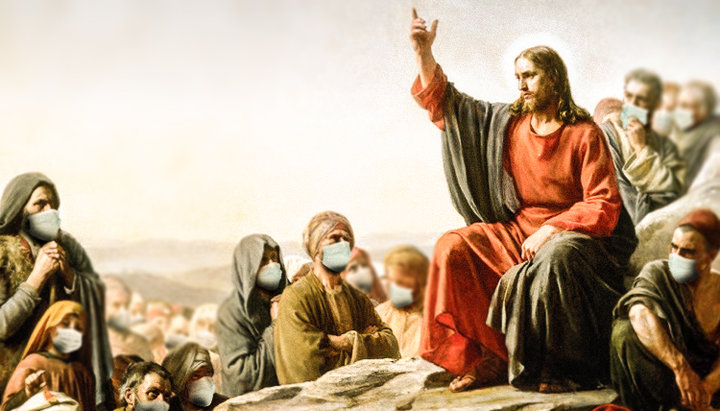
One of the theses of liberal theologians is that Christ could be ill with COVID, and that one can become infected through His Body and Blood. How much is that true?
There is an ongoing discussion on whether the Holy Communion is contagious or non-contagious. It gives birth to new arguments. The cleric of the Catholic Church from Kyiv, Peter Balog, stated that even Christ Himself, had He lived in our time, could well have become infected with the coronavirus. The ROC’s freelance cleric Cyril (Hovorun) claims that “microorganisms existed in the Resurrected Body of the Savior, which we partake of,” and one can become infected with any virus through the Body and Blood of Christ.
It is very difficult for a Christian, who reads in the Gospel that Christ raised the dead and commanded the elements, to imagine that the Savior could be exposed to viruses and bacteria against His own will, and it is very hard to believe that these microorganisms existed in the Resurrected Body of Christ. But perhaps, modern liberal theologians should know better?
Even the holy apostle Paul wrote in the Epistle to the Hebrews: “For we do not have a high priest who is unable to empathize with our weaknesses, but we have one who has been tempted in every way, just as we are—yet he did not sin” (Heb. 4, 15). And after him, the Fourth Ecumenical Council (451) approved the dogma of two perfect natures in Jesus Christ whereby our Lord Jesus Christ is perfect in the Divine and perfect in human, truly God and truly man, similar in the rational soul and body, coessential in Divinity with the Father and in humanness with us, in everything the same, except for sin. Likewise, a lot of holy fathers wrote that the so-called “natural passions” acted in the human nature of the Savior: He experienced hunger, thirst, needed clothes, and so on.
Diseases, like death, are consequences of the first sin. The Gospel speaks in detail about the death of Christ, but nowhere does it say that the Savior, whom we call "the only sinless one", was ever ill with something. What then is this assumption of Peter Balog about Christ and the coronavirus about? Let’s sort it out.
Diseases, like death, are consequences of the first sin. The Gospel speaks in detail about the death of Christ, but nowhere does it say that the Savior, whom we call “the only sinless one,” was ever ill with something.
Let's look into the context in which Peter Balog spoke about the possibility for Christ to become infected with the coronavirus. Balog was just one of the respondents for birdinflight.com, which published rather an extensive material on the attitude of various faiths towards the coronavirus and related quarantine.
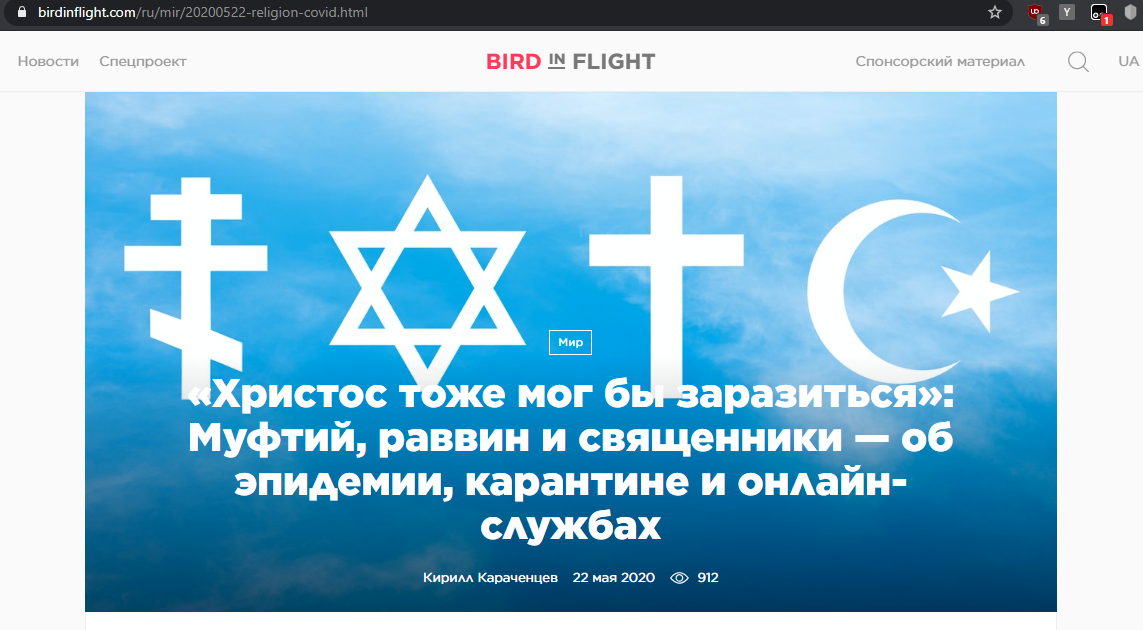
Moreover, it is interesting that birdinflight.com publication deals with completely different issues – photo industry, new forms of art, visual culture, sharing good practice and studying new trends.
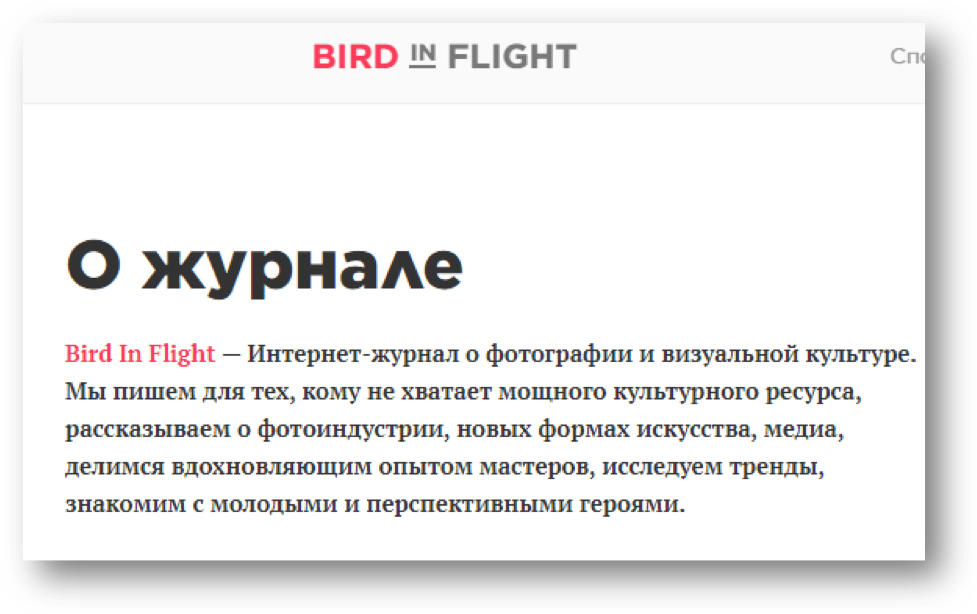
Given the current fight against the Church, any media platform can be suitable in order to uphold the thesis that restrictive measures taken in connection with the coronavirus do not infringe on the religious rights of citizens.
The key message of the publication is that everything is fine, quarantine does not infringe on any rights, we will all listen to what they say to us, we will transfer worship services online, we will close churches, we will not partake of the Holy Communion, and so on. Representatives of all major Ukrainian faiths spoke in this spirit. Except for the Ukrainian Orthodox Church, of course.
Georgy Kovalenko, “priest” of the OCU, rector of the Open Orthodox University believes that worship is quite comparable to a taxi service: “If believers use the Internet for communicating, preaching and broadcasting services, then Christ can also be present in virtual reality. <...> There will be real services, their broadcasts, and at the same time an online format where the very logic of virtual reality will create a structure for communication and community life. It's like Uber: first just a taxi, then additional features, and then these additional features affect the entire market and become the norm. This is also the case with online services. With the end of quarantine, this practice will be carried on.”
A comparison of worship with the Uber service is a particularly significant moment that clearly characterizes religious consciousness.
Alexander Dukhovny, chief rabbi of Ukraine and Kiev of the community of progressive Judaism: “In addition, we have this expression: ‘The law of the country where we live is the law for Jews.’ Jewish law cannot prevail over it. Therefore, those orders given by the Ministry of Health are valid for everyone. <...> I can’t hold funeral ceremonies physically – I do it via Zoom. <...> As a rabbi I want to see the eyes of my believers, but I can also see them via Zoom.”
Sheikh Said Ismagilov, Mufti of Muslims of Ukraine: “We, who live in Ukraine, have closed our mosques and cultural centers. Even during the holy month of Ramadan, no prayers are performed, there are no common meals in mosques. We told all people to pray and fast at home, and we urge all believers to take quarantine restrictions and doctors' recommendations seriously."
Peter Balog, Catholic priest, director of the St. Thomas Aquinas Institute of Religious Sciences in Kiev: “Christians are primarily people and only then Christians. They must adhere to all universal norms. If we put ourselves above what is human in us, this will lead to nothing but pride. If Jesus Christ lived now, these norms would apply to Him as a real and true person, incarnate God. Yes, I believe that Christ could be infected with the coronavirus. <...> Religious practices are usually public, and this is now prohibited. But poor is that Christianity that in its Christian essence is perceived only as the assembly in the temple.”
While Peter Balog only hinted that our Lord Jesus Christ might be infected with the coronavirus, Cyril Hovorun, who defined his status on Facebook as an Assistant Professor at Loyola Marymount University, even tried to theologically develop this thesis: “The resurrected Body of Christ, which we partake of, was ontologically the same body as ours. Microorganisms common for our body lived in Christ’s Body with the only difference that these microorganisms could not kill him. However, they can kill our body because it is not yet risen. Moreover, they can be transmitted through the Eucharistic Body of Christ, because they are not ontological evil but part of God's creation.”
We do not know all the properties of the human nature of the Savior after His Resurrection. We only know that, according to Maxim the Confessor, "the immutability of the will in Christ again returned impassivity, incorruptibility and immortality to this nature through His Resurrection."
The point is not that the Assistant Professor is consciously manipulating here, because the Holy Scripture does not tell us anything about microorganisms in the resurrected Body of Christ. The Body, in which the Savior passed through the walls, became invisible, covered great distances in a short time and ascended to Heaven. And whereas before the Resurrection this could be assumed due to the common nature of the human and Christ’s in everything except sin, then we cannot affirm it at all after the Resurrection. We do not know all the properties of the human nature of the Savior after His Resurrection. We only know that, according to Maxim the Confessor, "the immutability of the will in Christ again returned impassivity, incorruptibility and immortality to this nature through His Resurrection."
It's not even that Cyril Hovorun with this argument claims the possibility of infection through the Eucharist. In effect, the Assistant Professor, alongside Peter Balog and many other religious figures, is ready in the snap of fingers of state officials to abandon centuries-old church practice and even lay an appropriate theological basis under this “novelty”. We can see a certain conceptual direction, which consists in customizing religious needs to political requirements. The era of the Reformation in the West quite clearly articulated this in the "cujus est regio, illius est religio" principle, according to which the sovereignty of state power extends to the religious sphere as well.
It’s a well-known fact, in the first three centuries of Christianity, when the Church was persecuted and oppressed, Christians agreed to comply with all the laws of the state in which they lived, if these laws did not contradict their Christian faith. Moreover, Christians were the most law-abiding category of citizens in their states. However, in matters of faith, they were ready to go to death rather than choose a slippery slope of compromise. In full accordance with this understanding of the relationship between the Church and the state, the document “Fundamentals of the Social Concept of the Russian Orthodox Church” (2000) states: “The Church maintains loyalty to the state, but above the loyalty requirement is the Divine Commandment: to do the work of saving people in any conditions and any circumstances. If the government forces Orthodox believers to deviate from Christ and His Church, as well as to sinful, pernicious acts, the Church must refuse to obey the state.”
In the first three centuries of Christianity, when the Church was persecuted and oppressed, Christians agreed to comply with all the laws of the state in which they lived, if these laws did not contradict their Christian faith. Moreover, Christians were the most law-abiding category of citizens in their states. However, in matters of faith, they were ready to go to death rather than choose a slippery slope of compromise.
Whether the ban on worship and Holy Communion of believers is a compulsion for “Orthodox worshipers to deviate from Christ and His Church” is a debatable question. But this watershed has quite vividly showed who is eager to zealously customize and theologically substantiate ambiguous quarantine regulations, who is ready to abandon the forms of worship that have existed for 2,000 years and survived in more than one epidemic, and who approaches this issue more cautiously and carefully.
Whilst some people are engaged in discussing which microorganisms lived in the Body of Jesus Christ, others rightly note that no one has ever become infected from Holy Communion in world history. And this is not so much about which of the parties is more right, but about the path chosen by them. It is clear that supporters of changes in liturgical practice in the event of even greater restrictions along the second, third and so on waves of the coronavirus (or another virus, or not the virus at all) are much more likely to give up on significant religious prescriptions in order to please the authorities. Moreover, they will also bring along “theological rationale”, justifying the correctness of such changes.
Today's situation is a kind of litmus test to reveal those who are ready to defend their faith, and those who find arguments not to do this and at the same time blame others for backwardness and obscurantism. Let us recall the holy martyrs Maccabees. They were brutally tortured for refusing to eat pork. But how easy it would be to prove theologically that there is nothing awful and sinful in this. It would be no brainer for modern liberal religious figures to come up with a new excuse. But true Christians should be guided by the example of holy martyrs. There can't be any in-betweens.
